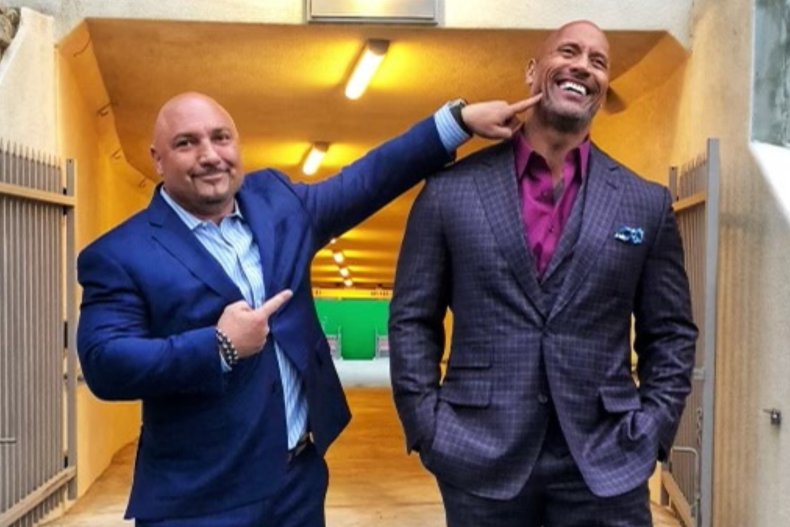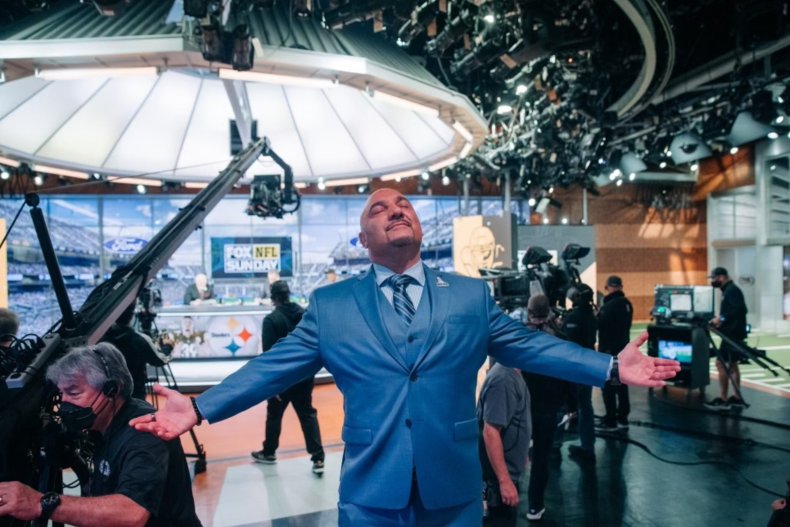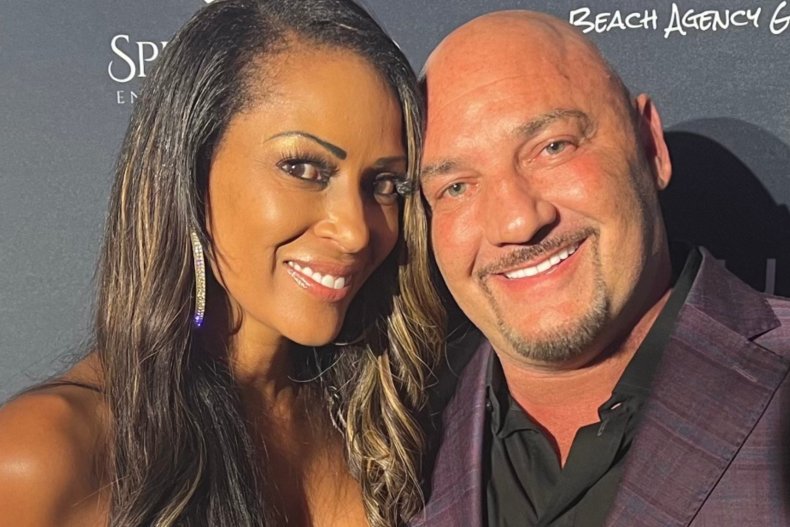I don’t have any memories of waking up outside of the gray. While I wasn’t able to put words to it when I was growing up, my earliest childhood memory was experiencing anxiety and depression.
For me, the gray is waking up and feeling as though the universe hates me. It feels like the world wants bad things for me and that I am unworthy of love. It’s almost like heavy chains are pulling me down; I feel it physically on the left side of my gut and my joints. It’s a visceral reaction.
The gray is always there, but when anxiety strikes, it feels like the sky is falling again. My heart starts racing a million miles a minute, my hands start shaking and my eyes start going back and forth. Then it leads to a panic attack.

Jay Glazer
The truth is, I know my life is great—but what’s going on between my ears sucks, so a lot of the time I am unable to feel the love that is really out there for me, or to feel worthy of receiving it.
I started working as a sports reporter in 1999, but it took me over a decade to get a full-time job. I spent 11 years living in New York City making less than $10,000 a year, but because this anxiety and depression told me I was so worthless, it made me even more determined to work harder and prove myself. While most reporters worked from 9 a.m. to 5 p.m., I was at the office from 7:00 a.m. until 10.30 p.m. every single day.
I made my first on-air appearance in 2005. It was just me and a cameraman inside an empty Allegiant Stadium, and all of a sudden the walls started caving in. It felt like I was having a heart attack.
From then on anxiety attacks became habitual. It happened every single time I was in front of the camera. Even when filming the scripted television series Ballers, and I knew I could stop, it would happen. I call it wrestling with my abuser—I’m trying to fight it, I’m trying to talk to it and get me to leave me alone, but it’s battling back.
Back in the 2000s, mental health was just not part of the conversation, so the first time it happened, I thought I was having a heart attack on air. I spent the next twelve years having doctors examine my heart until, finally, one told me I was having an anxiety attack.
While I now had the words to describe what was happening, I hid my suffering. I created “the Glaze”—this big character who was always laughing and making jokes to cope with his anxiety. For a long time, I wore that character as a badge of honor in football and fighting. Nobody knew how much pain I was in.
The pain of the gray is always there and it’s horrific. For me, the worst time is those 15 minutes at night when I lay my head on my pillow and I’m stuck with my own thoughts of what a bad human and how unworthy of being loved I am. It feels like there’s just no one else around to help me, which is really lonely.

Cindy Ord/Bob Levey/Getty
In the morning, I wake up and I’m usually exhausted from it. Every morning, I have to wake up and make a decision; I can lay in bed and let the gray take over, or I can get my a** out of bed. And once I get out of bed, I’m going to be relentless in how I attack this thing every day.
It wasn’t until a couple of years ago that I felt the need to finally be open about my mental health. I had just broken up with my girlfriend Rosie—who I am fortunately back together with because of the work that I’ve done on myself—and I reached out to some friends who I would be working with during the Super Bowl.
I flew to Tampa and said: “Hey, guys, I’ve got to talk. I’m in a bad way and I’m scared of myself. Life is about choices, and I’ll never commit suicide, but my pain is heavy. Every day sucks.”
Immediately everyone said: “We’ve got you. What do we need to do?” They gave me hugs and let me cry, and from there they called me every day. I knew I wasn’t alone anymore; every single one of them was there for me.

Lily Ro
Many people are afraid to show their emotions in this way, but guess what? No one’s questioning my manhood. I can cry and I can be vulnerable. That vulnerability has changed my life, and the space I now live in now is beautiful.
Now, if I’m struggling I open up and lean into my friends. If I’m feeling overwhelmed, I call The Rock immediately. He will drop everything and get right back to me. For us, it’s non-negotiable. He’s the most authentic friend I have.
Beforehand I never told my teammates at Fox what I was going through, but now if I am having a bad day before the show, I will text Curt Menefee or Howie Long and say: “Oh man I got one coming out of bed.” Just telling them takes away all the power from the gray.
I used to be afraid of bothering people, but now I realize that people want to be there, they want to help me. When I’m having a really bad day, where it’s hard for me to get out of bed—which has gone down to around three of the seven days a week—I call my friends and say: “Man, I’m struggling today.” We try to figure out what the trigger is, and then I’ll call to check up on them, because that’s my way of being of service.

Jay Glazer
I absolutely believe it’s harder for men to be open about their mental health struggles, because it’s ingrained in men to suck it up and not show emotion. But when I train players and fighters, I tell them the opposite.
Many people, especially athletes, are so proactive with their physical health, but only go to a therapist when the sky is falling. I believe that as a society we need to be a lot more proactive about mental health. There’s not enough therapists out there, so we have to start becoming each other’s therapists.
Since opening up about my mental health, there hasn’t been a week that’s gone past where someone, from a young age to a grandparent, hasn’t reached out and said: “Thank you for giving me these words. You’ve saved my life.”
I always felt I was cursed by the gray. But now I get these messages, I feel like God had a plan.
Jay Glazer is an NFL insider on Fox NFL Sunday, an MMA coach, actor, a veteran advocate and founder of Merging Vets and Players (MVP ), and the host of top charting podcast, Unbreakable. His new book Unbreakable: How I Turned My Depression and Anxiety into Motivation and You Can Too, is available in hardcover and e-book now and in paperback, April 16.
All views expressed in this article are the author’s own.
As told to Newsweek’s My Turn associate editor, Monica Greep.
Do you have a unique experience or personal story to share? Email the My Turn team at [email protected].
Stay connected with us on social media platform for instant update click here to join our Twitter, & Facebook
We are now on Telegram. Click here to join our channel (@TechiUpdate) and stay updated with the latest Technology headlines.
For all the latest For Top Stories News Click Here
